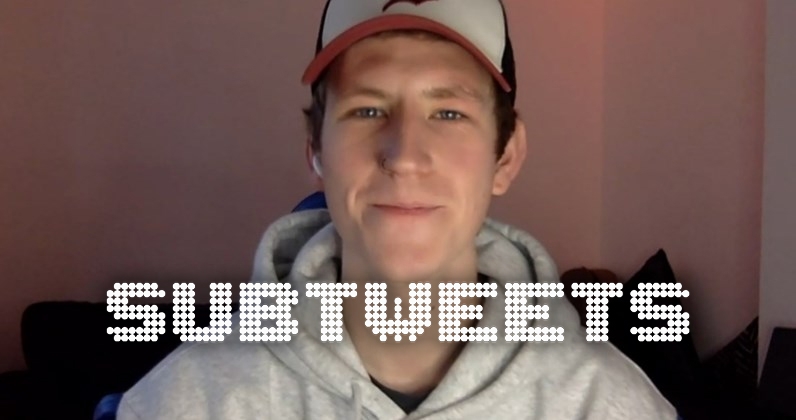What do Danielle Bregoli, Alex From Glastonbury and Michael Dapaah all have in common? Besides a penchant for questionable fashion choices, they’re all examples of a very modern kind of celebrity – the musical-adjacent meme. Blending humour, unexpected talent and just the right dose of weird, they become an instant part of our Internet lexicon with their shareworthy ditties – ‘Cash Me Outside’, ‘Man’s Not Hot’. Some work harder to capitalise on the moment than others, but the stature of being the most talked-about thing in the world, even if it’s just for a day, is normally enough to put pound signs in the eyes of record execs and influencer-spon agencies. It’s a curious thing to watch, and almost impossible to fully predict.
Truth is, internet-made novelty hits have always been a thing. Noughties kids will remember both Rebecca Black and Tay Zonday with MySpace-era fondness; two kids loved and mocked in equal measure for the exuberance of their precocious (but catchy) experiments with music. They were unconventional and distinctly non-commercial, but for some reason, we loved it, and in the infancy of meme culture, one song apiece was enough to ensure their place in the history books forevermore.
At the risk of sounding ancient, the naiveté of ‘Friday’ or ‘Chocolate Rain’ feels a world away from the BhadBhabies (or even LadBabies) of today. Nobody was gaming the system then – the transformation from bedroom normie to quirky household name was just happening, often with very little outset expectation. But as algorithmic knowledge and engagement number-crunching has grown cleverer, the construction of a musical-meme has become a highly logical way to pull a captive audience fast. But how do you make that audience stick?
Here’s where we reach the curious case of Nathan Evans. Whether you’re on TikTok or not, there is no getting away from the month’s seemingly endless talk of sea shanties – a true pandemic phenomenon. Spearheaded by one young Glaswegian postman’s seemingly-innocuous upload of a 19th-century whaling song, it’s spread in the way that only random internet content can, creating a domino effect of covers and shanty-reimaginations of popular hits by everyone from Nickelback to Taylor Swift. Having laid dormant for centuries, #ShantyTok has brought these folky ballads back to life. There have been shanties on Jimmy Fallon and BBC Breakfast, shanties from the US Military, shanties being dubbed over other memes and nearly-forgotten GIFs. It is meme-ception madness. With a Top 10 single under his belt, Evans has quit his job as a postman and signed to Polydor, where he promises to show the world that he has the chops to become a ‘real’ musician. If all goes to plan, it is surely only a matter of time before we see him rocking his first line of ShantyPanties on BooHoo Man, or promoting a range of protein shanty-shakes.
There’s no negating Evans point of musical difference (or the loveliness of the voice), but it’s this notion of a ‘real’ career that might be a difficult challenge to surmount. The concept of authenticity still looms large over the way many of us perceive music, and whether it’s snobbery or simple hypocrisy, we tend to see our TV or social-media-made stars as inherently more disposable once we’ve brought them to prominence, turning our intentions instead to the next viral trend. Interrupting that cycle to create a lasting fanbase takes real talent and persistence, and very few viral stars are able to prove that they are more than a time and a place.
The same can be said for meme culture more generally – the best ones work because they capture a specific zeitgeist, something that speaks deeply to who we are or the kind of distraction we need at that time. Trying to make ‘fetch’ happen for longer than its natural lifespan is often a real discredit to the joke, hanging on at the party long after the floor is being swept. Whether it’s Alex from Glasto’s ‘What Ya Kno Bout That Bro?’, Chris&Kem’s ‘Little Bit Leave It’ or even non-musical memes – the four lads in tight trousers, a mittened Bernie Sanders – the very best jokes can still be un-funnied when you carry them on too long. Where once a meme felt organic, it is often forced and regurgitated until all of its natural charm is swapped for something that feels cringingly self-conscious, an estranged parent desperately trying to reconnect with its kids.
One guy who perhaps has ridden this wave better than most is Munya Chawawa. Rising to prominence in the early days of the pandemic, his hilarious, witty sketch videos have truly been a high point of Twitter usage in the past year, and have directly led to his own recording career in the character of ‘Unknown P’, a posh drill rapper. Munya is ridiculously talented, but even he loses something in the ‘validity’ of a record deal – without the visuals and the organic feel of his earlier virality, there is something forced about Unknown P on record, a LOL without the knowing wink. You can’t organise that kind of fun.
Not everything has to last forever to be enjoyable, and not every meme can exist outside of its form. With platform being such an intrinsic part of what makes content great, maybe we don’t need our meme-musicians to be mainstream popstars any more than we need our YouTubers to be on terrestrial TV. If wholesome, working-class sea shanties are bigger than ever in a year’s time, I’ll merrily eat my words. But somehow, I suspect we will have found a whole new trend to write these sort of columns about.


